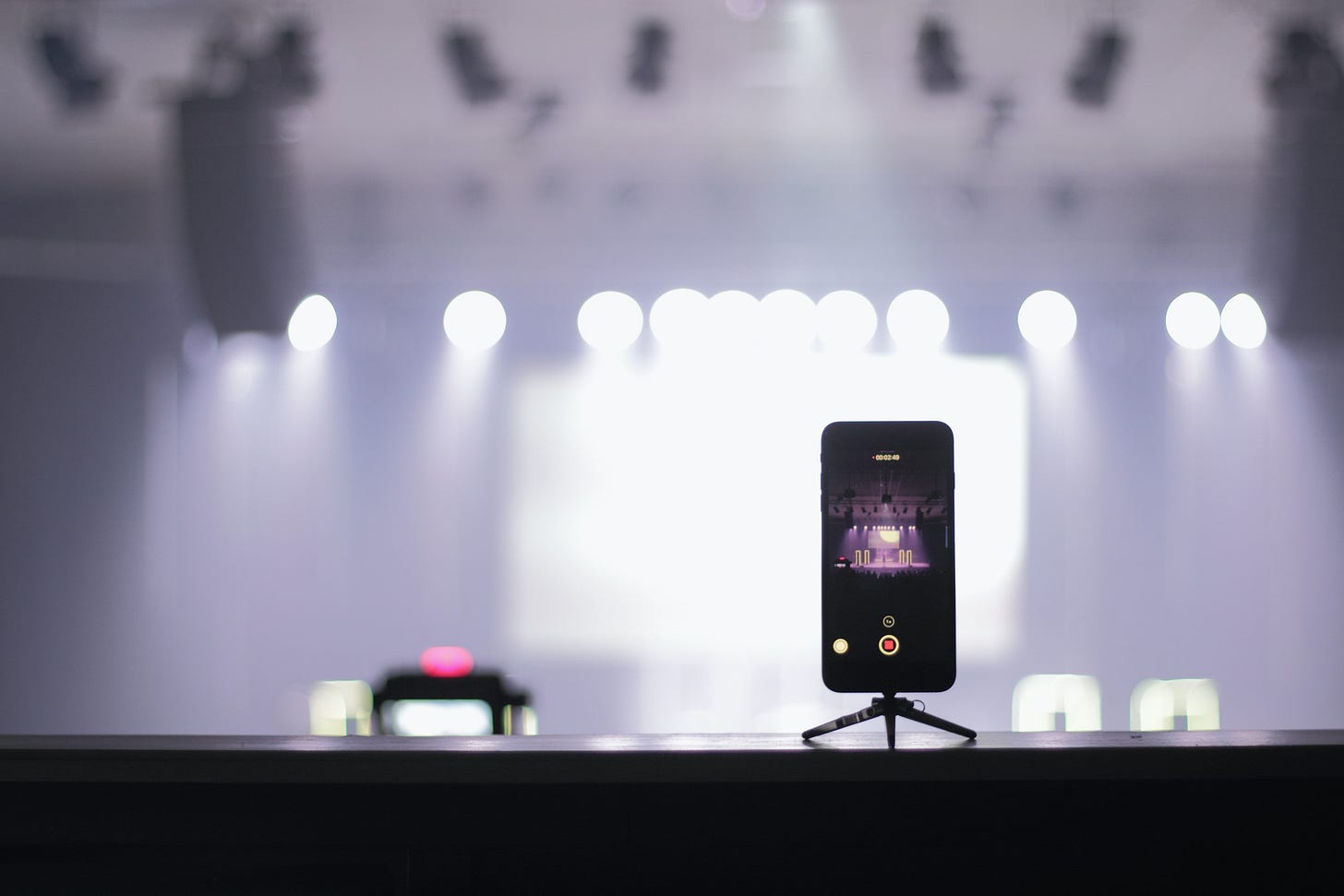😷 Is Apple waiving its App Store fees for Facebook streams valuable for music?
The 30% cut comes exactly when Facebook is looking to tighten restrictions for music streams.
Apple is (temporarily) waiving its App Store fee for Facebook’s online events amid a struggle for a wider, more permanent decrease in fees.

Photo by Obed Hernández on Unsplash.
What’s happening?
Facebook and Apple have reached a compromise and Apple won’t be taking their 30% cut for in-app purchases to access paid livestreams taking place on the Facebook platform, until the end of the year. Gamers, for some reason, are excluded from the exemption.
Facebook plays the “we’re helping struggling businesses” card and Apple whipped out their usual claim of how great the App Store is for developers around the world, and that they apply their rules for in-app purchase cuts equally to everyone (which is disputed).
What’s the bigger picture?
Apple is facing strong pressure related to its practice of taking a 30% cut of revenues generated through the App Store. This practice actually dates back to iTunes, where the split between Apple and rightsholders for music purchases was roughly 30/70.
Over the past years, companies’ objections to this cut have become increasingly public and cutting. To name a few:
Apple is under formal investigation by the EU after Spotify’s antitrust complaint.
Email app Hey got into a well-publicised argument with Apple over its App Store rejection earlier this year.
Not long after that, Epic Games made a move against Apple and implemented in-app purchases in Fortnite that clearly goes against Apple’s policies. Fortnite then got banned from the App Store (I wrote about it mid-August).
The above companies, as well as others, including Deezer, have joined forces in something called the Coalition for App Fairness.
What does the news mean for music?
First of all, the fight is far from over. Perhaps in the long-term it may lead to extra revenue coming into the industry, although services like Spotify don’t make use of Apple’s in-app purchases due to the 30% cut. It’s likely that in-app purchases would see better conversion rates from free to paid, but to what degree is unclear.
Back to Facebook.
With Facebook’s events, payments and ads infrastructure, it makes it a good platform for creators to drive audiences to paid livestreams. However from October 1, new music guidelines will come into effect, as part of Facebook’s updated terms of service. These stipulate:
“You may not use videos on our Products to create a music listening experience. […] If you use videos on our Products to create a music listening experience for yourself or for others, your videos will be blocked and your page, profile or group may be deleted. This includes Live.”
Although Facebook’s recent deals with majors and publishers for its gaming platform were well-publicised, the FAQ on the gaming platform also explicitly states:
“Your stream should be about gaming, not music. In other words, you’re okay to stream music as long as it’s in the background, with game sound effects and your voice (and anything else) over the top. Playing DJ without gaming is a no-no.”
It’s probably not that Facebook doesn’t want this type of activity on their platforms (more activity = more ad revenue, after all), but rather that they don’t have the licensing in place for this type of use case.
How well are they going to enforce the updated rules? Hard to say. Law professor Andrew Rossow thinks Facebook will use its algorithm to try to detect copyright-protected music and then take streams down, which is similar to what is already happening, but will continue in a perhaps stricter way.
So, a new unknown as we enter the year’s last quarter: will Facebook take more streams down than they are currently doing? Will certain types of music be more affected?
If some predictability emerges and artists can take calculated risks in running their streams through Facebook, then the 30% extra income from people who purchase their tickets via iOS is sure to receive a warm welcome by musicians and organisers.
Quick
Amazon’s hardware chief about Alexa devices in the pandemic:
“I think our homes are now our offices, they're our schools, they're our movie theaters. A lot of our products became even more applicable in this environment.”
The US’s largest performing arts organisation, the Metropolitan Opera, has decided to remain closed for another year. It’s now negotiating with unions about cost-cutting measures.
The LA Times about metal culture Deftones’ decision to release their album during the pandemic:
“Metal as a culture relies on gigs for the rush that comes with extreme music. If a new generation misses that while COVID-19 rampages, the scene might be forever changed, even if metal remains a reliable balm for bad times at home.”
Michelle Lhooq writes about the recent Utopia music festival in Pennsylvania, which required everyone to get tested prior to attending, so they could create a “corona free” bubble. While it’s definitely a measure worth consideration, it’s costs will be prohibitive for many organisers and as is pointed out in the article: it only takes one false negative to create a massive outbreak.
A planned 10,000 seat arena gives a look into what events may look like post-pandemic. Specifically, hygiene considerations are now seen as basic safety measures.
Rachel Black asks: could the DJ livestream renaissance be over? She cites general fatigue, platforms cracking down, and lack of revenues as some of the potential contributing factors.
If you’re new to the newsletter and are thinking “hey, I may know a colleague or two who would consider this valuable”, please consider sharing it with them directly, a Slack channel, or on LinkedIn.
MUSIC x CORONA is composed by Bas Grasmayer and Maarten Walraven.
❤️ musicxtechxfuture.com - musicxgreen.com - linkedin Bas - linkedin Maarten



Time that Music content makers stop relying on facebook. It should be used simply as promotion, directing to services that really pay, like Onlyfans, twitch and bandcamp.